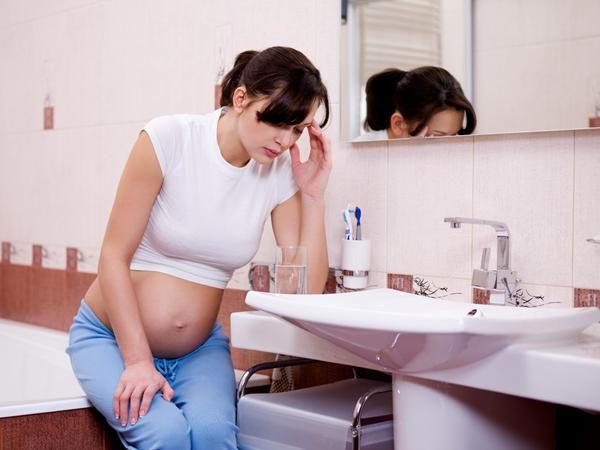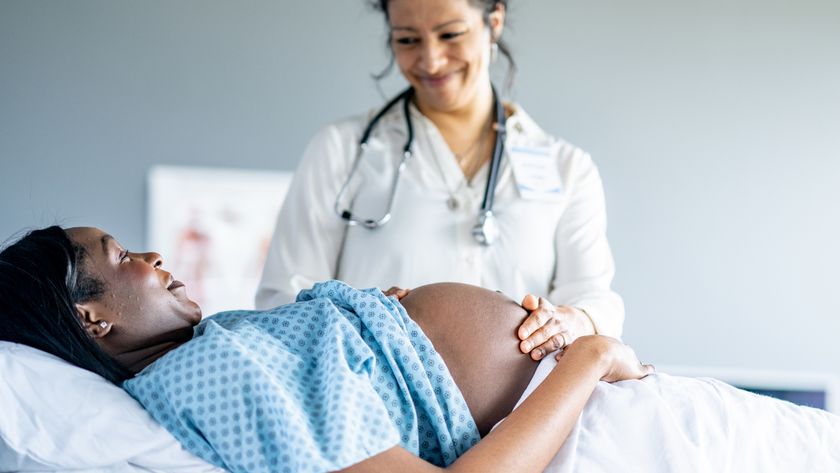Severe Morning Sickness May Pose Psychiatric Risks to Kids

When Kimber MacGibbon was pregnant with her first child in 1998, she suffered from extreme morning sickness. She vomited uncontrollably and felt terribly fatigued. Even with medication to control her nausea, she was sick at least once a day. During the first 14 weeks of her pregnancy, she lost 20 pounds.
"I couldn't stand up for any length of time, and I couldn't walk for any distance," MacGibbon said. She needed her husband's assistance for daily activities, including showering.
"It was a real struggle," she said.
MacGibbon, now a 43-year-old mother of two in Portland, Ore., still suffers pain and fatigue from that severe pregnancy sickness, also known as hyperemesis gravidarum, or HG.
She believes her condition contributed to behavioral and emotional problems in her son and her younger daughter. The boy, now 12, could not go to school until two years ago due to his social and emotional problems, MacGibbon said. He has trouble sharing and controlling impulses and is two to five years behind in some academic subjects, MacGibbon said. He also is very sensitive to noise, light and movement.
A new study involving 150 women supports the link MacGibbon found in her own experience.
The results show children whose mothers suffered from HG were 3.6 times more likely to have anxiety, depression or bipolar disorder when they grew up than children of mothers who did not have HG.
Sign up for the Live Science daily newsletter now
Get the world’s most fascinating discoveries delivered straight to your inbox.
The researchers said they initially had qualms about releasing their results, thinking the findings might be an extra burden on women already dealing with a crippling condition.
"The last thing a woman needs who's going through hyperemesis is to worry about something else," said Marlena Fejzo, an assistant professor of hematology and oncology at UCLA'sschool of medicine. But Fejzosaid she hopes the findings make doctors more aware of the long-term consequences of the condition and the importance of recognizing and treating it early.
Extreme morning sickness
HG is persistent nausea and vomiting in pregnancy that can lead to malnutrition and dehydration, according to the National Institutes of Health. Participants in the study had lost at least 5 percent of their weight. Usually treatment involves administration of intravenous fluids, and some women take anti-nausea medication.
Twenty-two percent of HG patients experience symptoms throughout their entire pregnancy. MacGibbon had major symptoms during the first and last trimester when she was pregnant with her son.
Few studies have looked at the long-term effects of HG on children.
Fejzo and colleagues enrolled 150 women with HG in their study, but because the researchers wanted to look at long-term effects on children, they asked these women whether the women's mothers had also had the condition. (It frequently runs in families.) The participants reported which of their siblings had been born after a pregnancy affected by HG, and the mental health of their siblings. The siblings were in their mid-30s on average.
The researchers found that 87 of the participants' siblings were born after a pregnancy affected by HG, while 172 siblings were born after normal pregnancies.
Overall, 38 percent of people whose mothers had HG had a psychological or behavioral disorder, while 15 percent of those whose mothers did not have HG had such a disorder.
Of those whose mothers had HG, 16 percent had depression, 8 percent had bipolar disorder and 7 percent had anxiety. Among those whose mothers didn't have HG, 3 percent had depression, 2 percent had bipolar disorder and 2 percent had anxiety.
Effects on children
The researchers said they can only speculate on what's behind the link.
Stress and anxiety during pregnancy, as well as malnutrition, may affect the fetus' brain as it develops, they said. In addition, women with HG may experience post-traumatic stress disorder (PTSD) or physical problems following their pregnancy that hinders their ability to bond with their child, paving the way for later behavioral disorders.
Few treatments exist for HG. The anti-nausea medication most in use was originally intended for chemotherapy patients (who experience nausea as a side effect of their treatment).
We need to find the cause of HG "so we can design treatments that work rather than just using chemotherapy drugs," Fejzo said.
Fejzo noted that the mothers of the women in the study were pregnant more than 30 years ago. Today, the rate of HG diagnosis and subsequent treatment is higher, so the risks for children may be lower.
For women who have HG, it's critical to get treatment early to reduce their complications, MacGibbon said. In 2002, MacGibbon co-founded the Hyperemesis Education and Research (HER) Foundation, an organization dedicated to helping women who've had or are currently suffering from HG.
Pass it on: Children of mothers who've had extreme morning sickness may be at increased risk for psychological disorders.
This story was provided by MyHealthNewsDaily, a sister site to LiveScience. Follow MyHealthNewsDaily staff writer Rachael Rettner on Twitter @RachaelRettner. Like us on Facebook.

Rachael is a Live Science contributor, and was a former channel editor and senior writer for Live Science between 2010 and 2022. She has a master's degree in journalism from New York University's Science, Health and Environmental Reporting Program. She also holds a B.S. in molecular biology and an M.S. in biology from the University of California, San Diego. Her work has appeared in Scienceline, The Washington Post and Scientific American.

'Love hormone' oxytocin can pause pregnancy, animal study finds

'Mini placentas' in a dish reveal key gene for pregnancy









